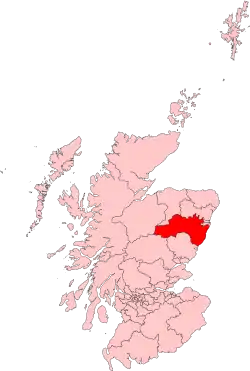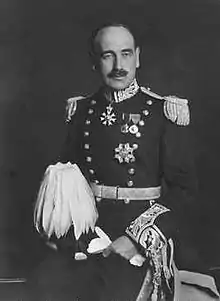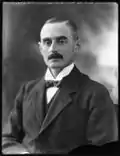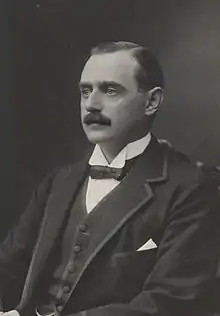West Aberdeenshire and Kincardine (UK Parliament constituency)
West Aberdeenshire and Kincardine is a county constituency of the House of Commons of the Parliament of the United Kingdom of Great Britain and Northern Ireland (Westminster), which elects one Member of Parliament (MP) by the first past the post system of election. It was first used in the 1997 general election, but has undergone boundary changes since that date. West Aberdeenshire and Kincardine was re-created as a parliamentary constituency in 1997, having previously existed as Kincardine and Western Aberdeenshire from 1918 to 1950.
| West Aberdeenshire and Kincardine | |
|---|---|
| County constituency for the House of Commons | |
 Boundary of West Aberdeenshire and Kincardine in Scotland | |
| Major settlements | Laurencekirk, Portlethen, Stonehaven, Banchory, Braemar |
| Current constituency | |
| Created | 1997 |
| Member of Parliament | Andrew Bowie (Conservative) |
| Created from | Kincardine and Deeside |
| 1918–1950 | |
| Created from | Aberdeenshire Western and Kincardineshire |
| Replaced by | West Aberdeenshire and North Angus and Mearns |
There was also a Holyrood constituency of West Aberdeenshire and Kincardine, a constituency of the Scottish Parliament,[1] created in 1999 with the same boundaries as the Westminster constituency at that time.
Boundaries
1918–1950
In 1868, the constituency of Aberdeenshire was divided into Aberdeenshire Eastern and Aberdeenshire Western divisions. These continued as constituencies until 1918, when the county of Aberdeenshire and the county of Kincardineshire were treated as if a single county for parliamentary representation purposes, with the area of the former Kincardineshire and Aberdeenshire constituencies being divided into three new constituencies, Aberdeen and Kincardine East, Aberdeen and Kincardine Central and Kincardine and Aberdeenshire West. In 1950 the Kincardineshire and Aberdeenshire counties were separated again, and a new boundary divided the Aberdeenshire area into East Aberdeenshire and West Aberdeenshire.
1997–2005
Kincardine and Deeside District, and the Gordon District electoral divisions of Donside and South Gordon.
2005–present
The area of the Aberdeenshire Council other than those parts in the Banff and Buchan County Constituency and the Gordon County Constituency.
The constituency covers a southern portion of the Aberdeenshire council area.
As redefined by the Fifth Periodical Review of the Boundary Commission for Scotland.[2] and subsequently first used in the 2005 general election, it is one of five constituencies covering the Aberdeenshire council area and the Aberdeen City council area. To the northeast of West Aberdeenshire and Kincardine there are the constituencies of Aberdeen North and Aberdeen South, which are both entirely within the Aberdeen City area. To the north of West Aberdeenshire and Kincardine, there is the Gordon constituency, which covers part of the Aberdeenshire area and part of the Aberdeen City area, and further north there is the Banff and Buchan constituency which, like West Aberdeenshire and Kincardine, is entirely within the Aberdeenshire area.
The West Aberdeenshire and Kincardine constituency includes the towns of Stonehaven, Portlethen and Banchory, and stretches along the Dee river valley from Westhill to Braemar, and north to Kemnay in the Don river valley, which were with the Gordon constituency until 2005, but are now within this constituency.
Members of Parliament
1918–1950
| Election | Member[3] | Party | |
|---|---|---|---|
| 1918 | Arthur Murray | Coalition Liberal | |
| 1922 | Liberal | ||
| 1923 | Malcolm Barclay-Harvey | Unionist | |
| 1929 | James Scott | Liberal | |
| 1931 | Sir Malcolm Barclay-Harvey | Unionist | |
| 1939 by-election | Colin Thornton-Kemsley | Unionist | |
| 1950 | constituency abolished | ||
1997–present
| Election | Member[4] | Party | |
|---|---|---|---|
| 1997 | Sir Robert Smith | Liberal Democrats | |
| 2015 | Stuart Donaldson | SNP | |
| 2017 | Andrew Bowie | Conservative | |
Election results
Elections in the 2020s
| Party | Candidate | Votes | % | ±% | |
|---|---|---|---|---|---|
| Liberal Democrats | Michael Turvey[5] | ||||
| Majority | |||||
| Turnout | |||||
| Swing | |||||
Elections in the 2010s
| Party | Candidate | Votes | % | ±% | |
|---|---|---|---|---|---|
| Conservative | Andrew Bowie | 22,752 | 42.7 | −5.2 | |
| SNP | Fergus Mutch | 21,909 | 41.1 | +8.6 | |
| Liberal Democrats | John Waddell | 6,253 | 11.7 | +3.1 | |
| Labour | Patrick Coffield | 2,431 | 4.6 | −6.5 | |
| Majority | 843 | 1.6 | −13.8 | ||
| Turnout | 53,345 | 73.4 | +2.2 | ||
| Conservative hold | Swing | −6.9 | |||
| Party | Candidate | Votes | % | ±% | |
|---|---|---|---|---|---|
| Conservative | Andrew Bowie | 24,704 | 47.9 | +19.1 | |
| SNP | Stuart Donaldson | 16,754 | 32.5 | −9.1 | |
| Labour | Barry Black | 5,706 | 11.1 | +6.6 | |
| Liberal Democrats | John Waddell | 4,461 | 8.6 | −12.8 | |
| Majority | 7,950 | 15.4 | N/A | ||
| Turnout | 51,625 | 71.2 | −4.0 | ||
| Conservative gain from SNP | Swing | +14.1 | |||
| Party | Candidate | Votes | % | ±% | |
|---|---|---|---|---|---|
| SNP | Stuart Donaldson | 22,949 | 41.6 | +25.9 | |
| Conservative | Alexander Burnett | 15,916 | 28.8 | −1.5 | |
| Liberal Democrats | Robert Smith | 11,812 | 21.4 | −17.0 | |
| Labour | Barry Black | 2,487 | 4.5 | −9.1 | |
| UKIP | David Lansdell | 1,006 | 1.8 | +0.9 | |
| Scottish Green | Richard Openshaw | 885 | 1.6 | New | |
| Independent | Graham Reid | 141 | 0.3 | New | |
| Majority | 7,033 | 12.8 | N/A | ||
| Turnout | 55,196 | 75.2 | +6.8 | ||
| SNP gain from Liberal Democrats | Swing | +21.5 | |||
| Party | Candidate | Votes | % | ±% | |
|---|---|---|---|---|---|
| Liberal Democrats | Robert Smith | 17,362 | 38.4 | −7.9 | |
| Conservative | Alex Johnstone | 13,678 | 30.3 | +1.9 | |
| SNP | Dennis Robertson | 7,086 | 15.7 | +4.4 | |
| Labour | Greg Williams | 6,159 | 13.6 | +0.5 | |
| BNP | Gary Raikes | 513 | 1.1 | New | |
| UKIP | Anthony Atkinson | 397 | 0.9 | New | |
| Majority | 3,684 | 8.1 | −9.8 | ||
| Turnout | 45,195 | 68.4 | +4.9 | ||
| Liberal Democrats hold | Swing | −4.9 | |||
Elections in the 2000s
| Party | Candidate | Votes | % | ±% | |
|---|---|---|---|---|---|
| Liberal Democrats | Robert Smith | 19,285 | 46.3 | +2.3 | |
| Conservative | Alex Johnstone | 11,814 | 28.4 | −2.1 | |
| Labour | James Barrowman | 5,470 | 13.1 | +0.8 | |
| SNP | Caroline Little | 4,700 | 11.3 | −0.8 | |
| Scottish Socialist | Lorna Grant | 379 | 0.9 | −0.2 | |
| Majority | 7,471 | 17.9 | +5.2 | ||
| Turnout | 41,648 | 63.5 | +1.5 | ||
| Liberal Democrats hold | Swing | +2.2 | |||
| Party | Candidate | Votes | % | ±% | |
|---|---|---|---|---|---|
| Liberal Democrats | Robert Smith | 16,507 | 43.5 | +2.4 | |
| Conservative | Thomas Kerr | 11,686 | 30.8 | −4.1 | |
| Labour | Kevin Hutchens | 4,669 | 12.3 | +3.2 | |
| SNP | John Green | 4,634 | 12.2 | −0.9 | |
| Scottish Socialist | Alan Manley | 418 | 1.1 | New | |
| Majority | 4,821 | 12.7 | +6.5 | ||
| Turnout | 37,914 | 62.0 | −11.1 | ||
| Liberal Democrats hold | Swing | +3.3 | |||
Elections in the 1990s
| Party | Candidate | Votes | % | ±% | |
|---|---|---|---|---|---|
| Liberal Democrats | Robert Smith | 17,742 | 41.1 | +6.4 | |
| Conservative | George Kynoch | 15,080 | 34.9 | −10.2 | |
| SNP | Joy Mowatt | 5,649 | 13.1 | +0.6 | |
| Labour | Qaisra Khan | 3,923 | 9.1 | +2.3 | |
| Referendum | Steve Ball | 808 | 1.9 | New | |
| Majority | 2,662 | 6.2 | N/A | ||
| Turnout | 43,202 | 73.1 | N/A | ||
| Liberal Democrats win (new seat) | |||||
Elections in the 1940s
| Party | Candidate | Votes | % | ±% | |
|---|---|---|---|---|---|
| Unionist | Colin Thornton-Kemsley | 10,932 | 51.5 | -5.4 | |
| Liberal | John Junor | 10,290 | 48.5 | +5.4 | |
| Majority | 642 | 3.0 | -8.8 | ||
| Turnout | 21,222 | 68.7 | -6.9 | ||
| Unionist hold | Swing | ||||
Elections in the 1930s
| Party | Candidate | Votes | % | ±% | |
|---|---|---|---|---|---|
| Unionist | Colin Thornton-Kemsley | 11,111 | 52.7 | -3.2 | |
| Liberal | Arthur Irvine | 9,990 | 47.3 | +3.2 | |
| Majority | 1,121 | 5.4 | -6.4 | ||
| Turnout | 21,101 | 71.4 | -4.2 | ||
| Unionist hold | Swing | -3.2 | |||

| Party | Candidate | Votes | % | ±% | |
|---|---|---|---|---|---|
| Unionist | Malcolm Barclay-Harvey | 12,477 | 55.9 | -5.7 | |
| Liberal | Arthur Irvine | 9,841 | 44.1 | +5.7 | |
| Majority | 2,636 | 11.8 | -11.4 | ||
| Turnout | 22,318 | 75.6 | -5.0 | ||
| Unionist hold | Swing | ||||
| Party | Candidate | Votes | % | ±% | |
|---|---|---|---|---|---|
| Unionist | Malcolm Barclay-Harvey | 14,266 | 61.6 | +13.4 | |
| Liberal | James Scott | 8,890 | 38.4 | -13.4 | |
| Majority | 5,376 | 23.2 | N/A | ||
| Turnout | 23,156 | 80.6 | +14.3 | ||
| Unionist gain from Liberal | Swing | ||||
Elections in the 1920s
| Party | Candidate | Votes | % | ±% | |
|---|---|---|---|---|---|
| Liberal | James Scott | 9,839 | 51.8 | +6.3 | |
| Unionist | Malcolm Barclay-Harvey | 9,171 | 48.2 | -6.3 | |
| Majority | 668 | 3.6 | N/A | ||
| Turnout | 19,010 | 66.3 | -1.0 | ||
| Liberal gain from Unionist | Swing | +6.3 | |||
| Party | Candidate | Votes | % | ±% | |
|---|---|---|---|---|---|
| Unionist | Malcolm Barclay-Harvey | 8,260 | 54.5 | +3.5 | |
| Liberal | James Scott | 6,889 | 45.5 | -3.5 | |
| Majority | 1,371 | 9.0 | +7.0 | ||
| Turnout | 15,149 | 67.3 | +5.5 | ||
| Unionist hold | Swing | ||||
| Party | Candidate | Votes | % | ±% | |
|---|---|---|---|---|---|
| Unionist | Malcolm Barclay-Harvey | 6,639 | 51.0 | New | |
| Liberal | Hon. Arthur Murray | 6,369 | 49.0 | -12.3 | |
| Majority | 270 | 2.0 | N/A | ||
| Turnout | 13,008 | 57.8 | +13.2 | ||
| Unionist gain from Liberal | Swing | N/A | |||

| Party | Candidate | Votes | % | ±% | |
|---|---|---|---|---|---|
| Liberal | Hon. Arthur Murray | 6,224 | 62.3 | N/A | |
| National Liberal | William Mitchell | 3,767 | 37.7 | New | |
| Majority | 2,457 | 24.6 | N/A | ||
| Turnout | 9,991 | 44.6 | N/A | ||
| Liberal hold | Swing | N/A | |||
Elections in the 1910s

| Party | Candidate | Votes | % | ±% | |
|---|---|---|---|---|---|
| C | Liberal | Arthur Murray | Unopposed | ||
| Liberal win (new seat) | |||||
| C indicates candidate endorsed by the coalition government. | |||||
References
- The boundaries of Holyrood constituencies remain as when the constituencies were created in 1999
Holyrood refers to the location of the Scottish Parliament Building near Holyroodhouse Palace in Edinburgh
See also Scottish Parliament constituencies and regions - "Fifth Periodical Review". Boundary Commission for Scotland. Archived from the original on 9 October 2007.
- Leigh Rayment's Historical List of MPs – Constituencies beginning with "K" (part 2)
- Leigh Rayment's Historical List of MPs – Constituencies beginning with "A" (part 1)
- https://www.facebook.com/MichaelLibDem/posts/pfbid0msJBhZYfui1icZ8B5ENkXDmgu3vXqQwFqNQHhtC5Cyvzfju1btsHGrnuVcfBAepl
- "General Election 2019". Aberdeenshire Council. Aberdeenshire Council. Retrieved 16 November 2019.
- "Aberdeenshire West & Kincardine parliamentary constituency - Election 2019". Retrieved 15 December 2019.
- "Commons Briefing Paper 8749. General Election 2019: results and analysis" (PDF). London: House of Commons Library. 28 January 2020. Archived (PDF) from the original on 18 November 2021. Retrieved 19 January 2022.
- "Results" (PDF). www.aberdeenshire.gov.uk. Retrieved 26 June 2021.
- "Commons Briefing Paper 7979. General Election 2017: results and analysis" (PDF) (Second ed.). House of Commons Library. 29 January 2019 [7 April 2018]. Archived (PDF) from the original on 12 November 2019.
- "Election Data 2015". Electoral Calculus. Archived from the original on 17 October 2015. Retrieved 17 October 2015.
- "Election Data 2010". Electoral Calculus. Archived from the original on 26 July 2013. Retrieved 17 October 2015.
- "BBC Election Results: West Aberdeenshire and Kincardine" – via www.bbc.co.uk.
- "Election Data 2005". Electoral Calculus. Archived from the original on 15 October 2011. Retrieved 18 October 2015.
- "Election Data 2001". Electoral Calculus. Archived from the original on 15 October 2011. Retrieved 18 October 2015.
- "Election Data 1997". Electoral Calculus. Archived from the original on 15 October 2011. Retrieved 18 October 2015.
- "Aristotle: Aberdeenshire West and Kincardine", Guardian Unlimited
- Whitaker's Almanack, 1944
- Whitaker's Almanack, 1939
- Whitaker's Almanack, 1934
- The Times, 1 June 1929
- Oliver & Boyd's Edinburgh Almanack, 1927
- The Times, 8 December 1923
- The Times, 17 November 1922